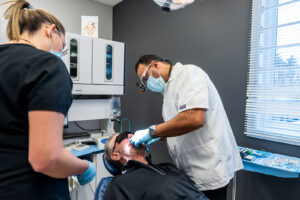Dental implants in London Ontario provide a reliable way to replace missing teeth and restore function. Luka Dental Implants explains each stage in clear terms. This overview helps people understand timelines, pain control, and recovery. The team aims for predictable results and patient comfort. This guide walks through each step of the implant journey. At Luka Dental Implants in London, On we pride ourselves on informing our clients and ensuring your needs and questions are met with clear answers.
Dental implants in London: Initial consultation
Dental implants in London begin with a focused consultation. The dentist reviews medical history and oral health. Imaging and treatment options follow. The clinic explains suitability, timelines, and costs. Shared decision making ensures patients understand expected outcomes. Luka Dental Implants answers questions about sedation, bone needs and provisional teeth.
Planning and imaging for Dental implants in London
Dental implants in London rely on CBCT scans and digital impressions. These tools map bone and nerve locations precisely. Surgical guides may be created to improve accuracy. Careful planning reduces surprises during implant placement. The plan may include temporary teeth when clinically suitable. The team discusses materials, timelines and follow up visits.
Surgery and immediate care for Dental implants in London
Dental implants in London surgery usually uses local anaesthetic with sedation on request. Implants are placed into the jaw with careful technique. Temporary prosthetics attach when indicated to restore function. The clinic provides clear post-op instructions for comfort and healing. Patients receive prescriptions, ice recommendations and soft diet guidance.

Recovery and long-term care for Dental implants in London
Dental implants in London recovery commonly involves swelling and mild soreness for days. Rest and soft food improve comfort. Follow-up visits check healing, provisional fit and soft tissues. Final crowns or bridges arrive after osseointegration, often three to six months later. Long-term care includes daily cleaning and regular professional maintenance.
Pain control and healing timeline
Most patients report manageable pain after implant placement. Pain control often includes short courses of prescription medication. Some patients use over the counter analgesics alone. The clinic reviews signs that need urgent attention. Smoking and some health conditions can slow healing. Good sleep and gentle oral hygiene support steady recovery.
What to expect at final restoration
At final restoration, dental implants receive custom crowns or a fixed bridge. The team adjusts the bite for comfort and function. The result restores chewing power and a natural look. Routine maintenance visits ensure long term success. Occasional polishing and small adjustments keep the restoration performing well.
Maintenance and prevention of complications
Daily home care and professional follow up protect implant health. The clinic recommends a tailored recall schedule and cleanings. Avoiding tobacco helps gum and bone health. Good nutrition supports healing and long term stability. Early detection of issues reduces the risk of implant complications.
Why choose local care for implant treatment
Local care at Luka Dental Implants in London, ON simplifies follow up. The team offers modern imaging and hands on support. Easy access to the clinic helps with emergency needs and routine care. The clinic coordinates treatment around work and family commitments.
Next steps to begin implant treatment
A consultation clarifies options and creates a custom plan. Luka Dental Implants provides a detailed estimate and timeline. Contact the clinic at 519-472-4460 to arrange an assessment. The team guides each patient through treatment choices and aftercare. During September, the clinic highlights concussion, arthritis and gum care awareness. Dental implants in London patients receive tailored advice if concussion or facial trauma occurred. Those with arthritis get medication and joint guidance that supports healing. Good gum care reduces risks like peri-implantitis and supports long term implant success.

